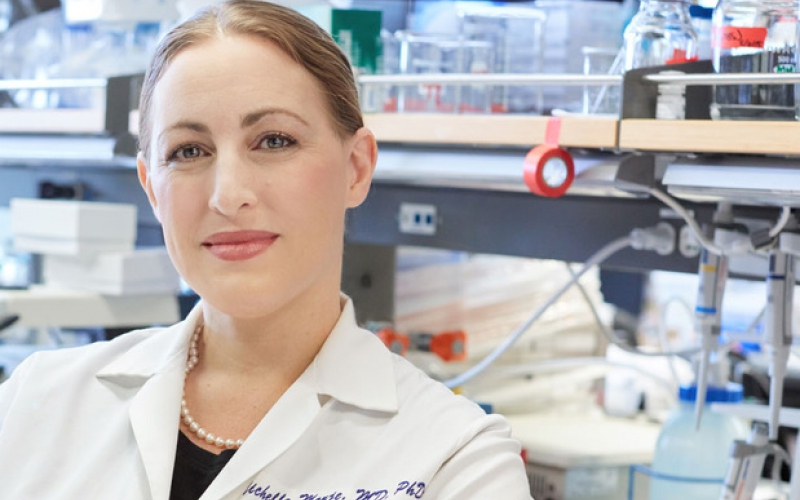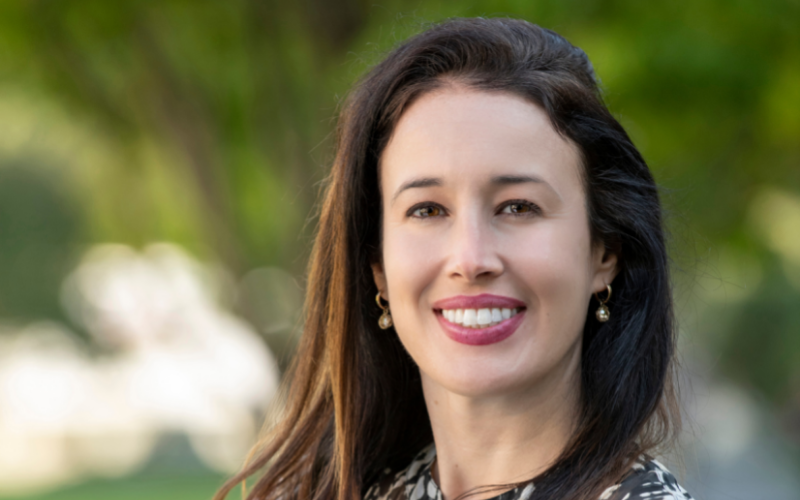By: Trish Adkins
Two Alex’s Lemonade Stand Foundation (ALSF)-funded researchers, Michelle Monje, MD/PhD and Cigall Kadoch, PhD, have been named as Howard Hughes Medical Institute (HHMI) Investigators.
The HHMI program supports more than 250 investigators, located at more than 60 research institutions across the United States. As HHMI investigators, Dr. Monje, who is based at Stanford University will study the interactions between aggressive brain cancers, like glioma, and the nervous system’s circuity; and Dr. Kadoch, who is based at Dana-Farber Cancer Institute, will study chromatin and gene regulation in childhood and adult cancers. Both will receive $9 million over a 7-year period.
It is particularly exciting for the ALSF community that HHMI has awarded two Investigator-ships to researchers who are intensely focused on the biology of childhood cancers.
In her studies, Dr. Monje has found that aggressive brain tumors, like gliomas such as Diffuse Intrinsic Pontine Glioma (DIPG), are driven by the activity of neurons in the tumor microenvironment. She found that gliomas are so intimately integrated with the neural circuits in the brain that activation of neurons can send electrical signals flowing through the tumor and spur its growth. Her studies that combine neuroscience and cancer biology have led to the launch of a clinical trial evaluating a potential treatment for children with malignant gliomas.
Dr. Monje has received three research grants from ALSF, including her first grant, an ‘A’ Award Grant in 2011, to study the most deadly form of childhood cancer, DIPG. The 'A' Award is designed for the early independent career scientist who wants to establish a career in pediatric oncology research. In 2019, Dr. Monje received a Crazy 8 Pilot grant to further study DIPG.
In addition, ALSF has also supported Dr. Monje’s work researching high-grade pediatric spinal cord gliomas with an Innovation Grant. Innovation Grants are designed to provide critical and significant seed funding for experienced investigators with a novel and promising approach to finding causes and cures for childhood cancer.
High-grade spinal cord gliomas are rare tumors, clinically devastating and appear to demonstrate mutations similar to DIPG. Using her ALSF grant, Dr. Monje was able to create a patient-derived spinal cord glioma model. Having a dependable model system for the disease allowed her team to bring forward promising lead drug candidates can and test those therapeutic approaches, which led to two clinical trials.
“ALSF helped launch my research program 10 years ago and has supported my lab at every step along the way. Their investment in childhood cancer research has transformed the field and nurtured the development of a generation of childhood cancer researchers,” said Dr. Monje.
Dr. Kadoch’s studies and expertise in the chromatin regulatory system have not only enabled the development of new therapeutic strategies for those cancers, but given the research community the mechanistic framework to understand a very large fraction of all cancers, both rare and common.
Chromatin is the substance in cells consisting of DNA, RNA and associated proteins. Oncology researchers study the systems that regulate chromatin and gene expression to better understand the origins and growth of childhood cancers, which then can lead to the development of targeted therapeutics to treat these rare and complex diseases.
ALSF first funded Dr. Kadoch in 2013 with a Young Investigator Grant. These early-career grants are designed to fill the critical need for startup funds for less experienced researchers to pursue promising research ideas. Dr. Kadoch used the grant to study chromatin remodeling in synovial sarcoma, the most common non-rhabdomyosarcoma soft-tissue malignancy in pediatric cancer patients. These tumors are aggressive and largely resistant to conventional chemotherapy.
Then in 2017, Dr. Kadoch was the recipient of an ALSF ‘A’ Award to further her synovial sarcoma studies.
In this study, Dr. Kadoch specifically studied the BAF chromatin remodeling complex, which is the central molecular player in synovial sarcoma, driven by a fusion oncoprotein known as SS18-SSX. The SS18-SSX fusion protein is found in nearly 100% of synovial sarcoma cancers and Kadoch discovered that it acts by interacting with and perturbing the BAF complex.
Dr. Kadoch says that ALSF’s grant support has been pivotal in continuing her work studying the molecular drivers of rare childhood cancers.
“The ‘high-risk, high-reward’ studies that ALSF supported are some of the very studies that best represent me, our science and serve as the platform for the work we have ongoing and propose for the future,” said Dr. Kadoch. “It doesn’t escape me that the support from ALSF has been instrumental, and I extend my deep appreciation to ALSF for supporting our science from the very beginning.”
Attracting and retaining the best and brightest early-career scientists and funding experienced investigators is critical to the future of childhood cancer research. Early-career grants from ALSF encourage and cultivate the best and brightest researchers of the future, lead to long-term research projects, support researchers in their quest for more funding and grow the field of pediatric oncology research. Learn more about the ALSF Research Program Areas.



